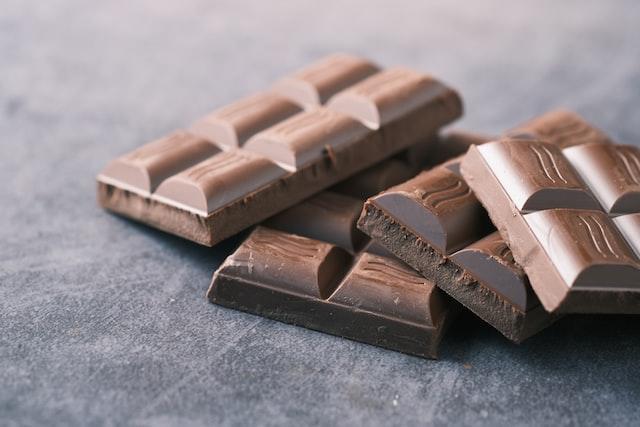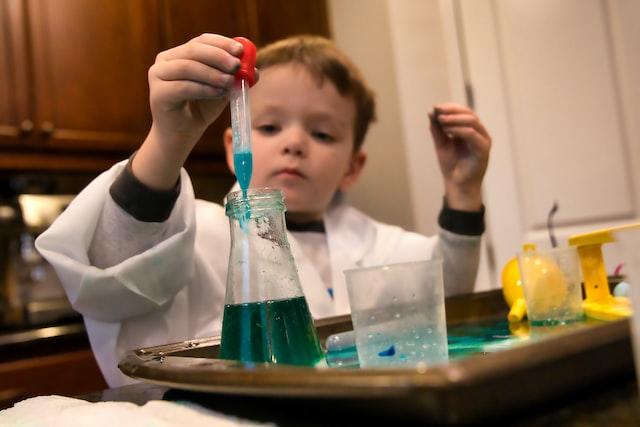Hands up if you have some CHOCOLATE related food at home right now.
It could be Milo, a cake or literally a box of Ferrero Rocher that you just bought for Christmas.
You might be wondering where is this leading.
As you bite into that next piece of chocolate, do you know that it takes a good mastery of CHEMISTRY to make chocolate look good and taste good?
If you dive deep into the details, you'll discover that the magic of Chemistry in a bar of good chocolate begins from the very start of harvesting the cocoa plant to manufacturing it according to the right temperature and ingredients from one place to another.
Likewise, you have to start somewhere or even move about several locations and stages to master Chemistry as a field of study truly.
In this article, we will explore some direct and indirect ways in which Chemistry is applied in our everyday life and also look into various places and institutions where you can discover more about Chemistry, specifically in Malaysia.

What Has Chocolate Observation Got To Do With Chemistry?
We're pretty sure that you can't stop thinking about chocolate as you are reading this now.
Here are some interesting facts on the relationship between chemistry and chocolate to get the ball rolling.
Point 1: Under different melting points (crystallisation), chocolates will have different properties and states.
Though we are most familiar with the solid state of chocolates and also how some of them begin melting upon reaching room temperature.
A key component that is used to make chocolate (milk chocolate, black chocolate, white chocolate) is cocoa butter, which is an edible fat that is extracted from cocoa beans.
To fully transform into a solid state, cocoa butter will undergo a crucial process of what we describe as tempering in which the fats in the cocoa butter will be crystalised in different forms according to different melting temperatures as shown in the table below.
| Melting temperature | Types of crystal | Properties of the chocolate |
|---|---|---|
| 17 °C | I | Soft, crumbly, melts too easily |
| 21 °C | II | Soft, crumbly, melts too easily |
| 26 °C | III | Firm, poor snap, melts too easily |
| 28 °C | IV | Firm, good snap, melts too easily |
| 34 °C | V | Glossy, firm, best snap, melts near body temperature (37 °C) |
| 36 °C | VI | Hard, takes weeks to form |
From the table, you'll notice that among the six, type V crystals are the best type to make solid and smooth chocolate.

Photo by Towfiqu barbhuiya on Unsplash
Point 2: Different chocolates have different flavours due to the different ratios of cocoa and fat content (manufacturing)
Here are some examples according to the chocolate requirements in the European Union and the United Kingdom:
- Dark chocolate [Consists of roughly 35% dry cocoa solids, 18% cocoa butter and 14% non-fat cocoa solids]
- Milk chocolate [Consists of approximately 25% dry cocoa solids, 2.5% non-fat cocoa solids, 25% combined cocoa butter and milk fat content, 3.5% milk fat and 14% milk solids]
- White chocolate [Consists of around 25% cocoa butter and 14% milk solids]
Read more about the benefits of learning Chemistry.
Why You Should Conduct Simple Chemistry Experiments At Home With Your Kids?
At times, the basis of Chemistry education begins at home, from a very tender age.
If you are a parent to a young kid, this is your sign to start browsing for some simple chemistry fun experiments that the whole family can do together like the mentos and coke experiment that has since become viral globally.
Here are two important reasons why you should kickstart your first Chemistry lessons back home among younger children.
Reason 1: Instil curiosity and passion for observing
You can expect a lot of "Why" and " How" questions whenever you carry out these simple experiments at home.
Instead of spoonfeeding them with direct answers, you can lead them to observe and come out with simple reasonings based on their observation of the experiments. In the long run, this is a very good exercise that can cultivate a passion for Sciences and the natural surroundings.
Reason 2: Allow them to be hands-on from the get-go
As you are planning the experiments, you can let them be in charge of preparing the props, setting up the table and also the tabulation process such as recording the final reading, taking pictures and so on.
That way, they will be naturally exposed to the nature of many science-related experiments and learn to enjoy them as they grow older. We guarantee you that in a few years, they will be breezing through their Chemistry lab experiments in school.

Photo by Clint Patterson on Unsplash
Explore these resources to take your Chemistry game to the next level.

What Are Some Official Chemistry-Related Organisations In Malaysia?
Thinking of visiting some chemistry organisations locally and learning more about the research and development of the industry?
We got you covered.
Here are two organisations that you should know of.
Malaysia Institute of Chemistry (Institut Kimia Malaysia)
Located at Taman Tun Dr Ismail, Kuala Lumpur, this institute was officially registered in 1967 and it is currently under the jurisdiction of the Ministry of Science, Technology & Innovation (MOSTI).
The functions and activities that are carried out by this institute include:
- Chemistry Publications
- Professional Courses and Continuing Education Programmes
- The Organisation of Malaysian National Chemistry Quiz (K3M)
- Technical and Professional Visits, and Study Tour and many more
Department of Chemistry Malaysia (Jabatan Kimia Malaysia)
Another important organisation that you should take note of is none other than Jabatan Kimia Malaysia.
Situated at Petaling Jaya, this department oversees massive and intensive lab research work and legislation over the country which covers the following divisions and branches such as:
- Forensics Science Analysis Centre
- Quality Management and Research Centre
- Drinking Water, Food and Environmental Safety Analysis Centre
- Development and Information Technology Division
- Service Management Division
- Chemistry Malaysia Training Centre
Discover the properties and characteristics of these branches of Chemistry in this article.
Should You Continue To Take Chemistry For Your Pre-University Studies After Completing Your SPM/IGCSE?
Assuming that you have taken Chemistry during your SPM or IGCSE studies and you are now deciding if you should continue to pursue this subject at a higher level.
It's best to refer to these two questions before reaching a conclusion.
Question 1: Is your SPM/IGCSE Chemistry grade satisfactory?
At this stage, you need to be objective and honest about your actual competence in Chemistry.
If your final grade is below a credit, it could be a sign that Chemistry is not for you. Of course, you have to take into account your results throughout your Form 4 and Form 5 studies.
If you have consistently excelled but you have missed an A+ or A by just one grade, you could still think about it.
Question 2: Do you intend to go into a chemistry-related career one day?
This is also another important question.
Are you truly passionate and confident that you would want to venture into a career that is Chemistry focused?
That's because if that is the case, you have to dedicate at least 3 years in university to master Chemistry as a whole. If you are interested to do a research postgraduate programme, it could take another 2 to 4 years depending on your specialisation.
Let's say if you know that your passion lies in language and history, you may want to switch your focus on other subjects for your pre-university and undergraduate studies.
However, if you are keen to study Chemistry and determined to be a chemist one day, then you can certainly go for it and start preparing now.

Photo by Hannah Busing on Unsplash
Building A Strong Foundation in Chemistry With A Superprof Chemistry Tutor
One way to cultivate confidence and competence in Chemistry during your secondary school days is to hire a private tutor to take your skills to the next level.
At Superprof, you can easily find an experienced and capable Chemistry tutor that matches your needs and preferences in terms of the following criteria:
- Physical location (If you opt for home tutoring)
- Maximum budget (You get to decide the hourly rate of the lessons)
- Teaching methodology
- Years of tutoring
- Teaching scope
- Reviews of former students
All you need to do is just head to the Superprof Malaysia homepage and begin browsing the tutors' profiles after you have key in your desired subject and location.
From there, the system will filter the relevant information and lead you to a pool of dedicated Chemistry tutors according to your input. Once you have reviewed and compared the given information between the tutors, you can then proceed to contact the tutor to discuss about your future lessons via the Student Subscription Pass at only RM25.
Learning has never been so easy and convenient!
Interested In Pursuing R&D/Lecturing One Day? Find Out Which Universities Offer Chemistry Related Postgraduate Programmes In Malaysia.
After finishing your undergraduate studies in Chemistry, you might want to pursue a full time in research and development or academia. To do that, you'll need at least a Master's degree or even a PhD qualification.
Here are some suggestions on the universities that offer various postgraduate Chemistry programmes in Malaysia.
If you are into analytical chemistry
- University: University of Malaya
- Program: Master of Science in Instrumental Analytical Chemistry
- Subjects offered: Quality Assurance in Analytical Laboratory, Atomic Spectroscopic Analysis, Molecular Spectroscopic Analysis and many more.
If you are into pharmaceutical science
- University: UCSI University
- Program: Master of Science in Pharmaceutical Chemistry
- Subjects offered: Chemistry of Drug Design and Discovery, Advanced Separation Sciences, Advances in Spectroscopy and a few more
If you are into pure Chemistry research
We understand that you may have your own interest and preferred chemistry specialisations. What you can do is enrol in a general Master of Science in Chemistry at any university in Malaysia.
Important tip: remember to check out the universities' research thrust areas for different chemistry branches to see if your research interest fits.
To kickstart your Chemistry research journey, read this article and be inspired by the contributions of these notable chemists here.
We hope these chocolate and chemistry relationship facts have encouraged you to look at Chemistry from a different perspective. There are plenty of places and platforms for you to master Chemistry so sit back and enjoy this learning adventure!
Summarise with AI:















